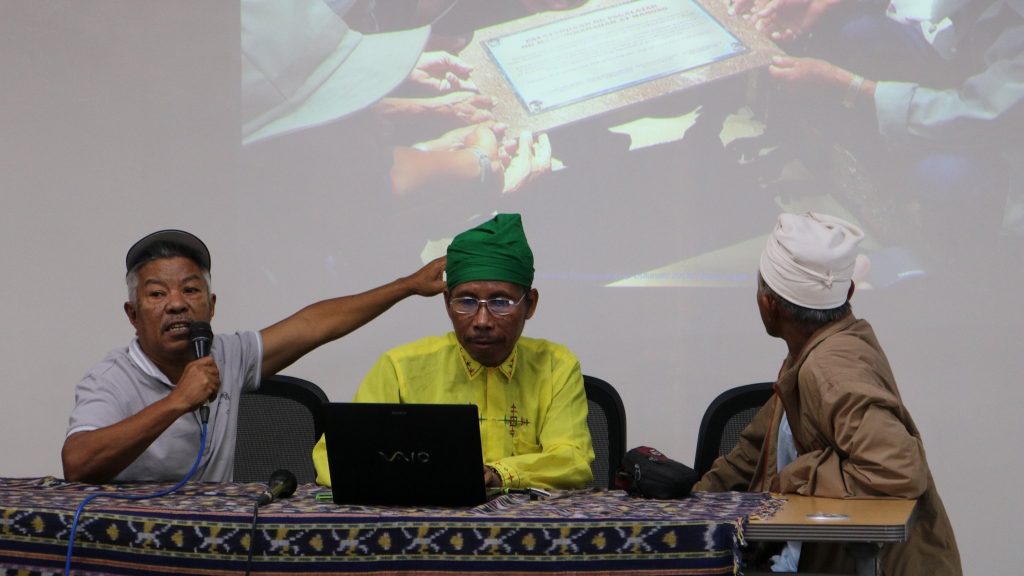
“Indigenous peoples’ communities have had enough being caught in the crossfire in the country’s armed conflict between the insurgents and the state. This cycle of turning our ancestral domains into battlegrounds for more than 50 years now must end. Decades of conflict have taken its toll on our communities, but we remain committed in asserting our inherent, inalienable and collective rights to identity, ancestral domain cum territory and right of self-determination and self-governance.”
This was how Lumad Husay Mindanaw (LHM), an independent dialogue platform, summed up the plight of indigenous peoples (IPs) in Mindanao stressing the need for an inclusive peace process that addresses the roots of the armed conflict and allows for meaningful participation of the affected IP populations.
As part of their 2-day lobby mission from November 21-22,leaders of indigenous peoples (IPs) from Mindanao, under LHM,together with other civil society groups held a press conference on the 22ndin Quezon Cityreiterating their positions and views particularly on challenges confronting them in both the Bangsamoro and GRP-NDFP peace processes.
With the formal GRP-NDFP peace negotiation still in limbo as aresult of the termination of the talks 2 years ago, the armed conflict is far from over. LHM said, “We may have grown tired of war, but not in the assertion of our rights. And we will continue to do so especially in the light of the government’s creation of national inter-agency task forces to implement E.O. 70 and E.O. 79, on the ‘localized peace process’ and the implementation of the Bangsamoro Normalization, respectively.”
Launched last year, LHM is a convergence platform engaging various actors involved in the GRP-NDFP peace process between the Philippine government and the CPP/NPA/NDFP. Composed primarily of indigenous peoples, LHM offers an indigenous way of engaging the peace process through the promotion of what they call “husay” as a system of conflict settlement.
Anticipating the accelerated implementation of the E.O 70, issued by President Duterte after the termination of GRP-NDF negotiations, (E.O 70 aims to institutionalize a “whole -of- nation” approach in attaining inclusive and sustainable peace, creating a National Task Force to End Local Communist Armed Conflict, and directing the adoption of a national peace framework.).
The group explained that the proposed directive on E.O 70 “cannot substitute a peace process even with a promise of localization and inclusion if, in the proposed structure and process, the civilians (especially those who are vulnerable and directly affected) are not meaningfully included nor substantively represented.”
The group further asserted, “Only a just political settlement designed towards genuine institutional and systemic reforms can provide the fundamental steps in addressing the roots of the armed conflict. EO 70 is not a political solution to the armed conflict.”
IP leaders under LHM also issued an appeal to President Rodrigo Duterte and various government agencies implementing E.O 70 to dialogue with them, and other victims and survivors of armed conflict. They reiterated the same plea to the NDF.
The group added, “We are the greater bulk of the indigenous peoples who are caught in the crossfire, harassed, intimidated, tortured and killed due to this protracted conflict.”
They stressed, “We appeal to the President to hear us out in a formal dialogue.We want to articulate our concerns and present specific recommendations on how the Lumad can meaningfully participate in the national peace process and how this will be responsive and beneficial to the needs of our communitiesdirectly affected by the conflicts as we are unwillingly hosting this armed conflict in our ancestral domains for the longest time.”
The group also shared their views on E.O. 79 implementing the annex on normalization under the Comprehensive Agreement on the Bangsamoro (CAB), particularly the challenges confronting the IP communities in the midst ofthe Bangsamoro’s political transition.
LHM explained, “As the Bangsamoro gears itself towards complete transition, we aim to advocate and work for the full inclusion of the Indigenous Peoples rights and enabling laws in the Bangsamoro governance to ensure the recognition and protection of the IP rights and to correct historical marginalization and exclusion.”
LHM is composed of three IP networks in Mindanao, namely the Lumad Mindanao Peoples Federation (LMPF), Katawhang Lumad of Mindanao Peoples’ Peace Movement (KL-MPPM) and the Mindanao Indigenous Peoples Peace Forum (MIPPF).

Recent Comments